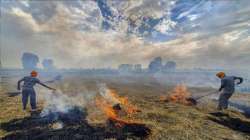Rains delayed harvesting, expect clustering of stubble burning incidents: Experts
Stubble Burning Issue: As the Winter approaches stubble burning menace is once again set to hound North region. Experts said a spike in stubble burning is also possible around Diwali.

Stubble Burning Issue: Two prolonged spells of rain -- in late September and October -- have delayed paddy harvesting by a week in parts of Punjab and Haryana which could lead to a spike in stubble burning incidents, experts said on Wednesday.
They said the delay could result in farmers racing against time to prepare their fields for the next crop and hence, a sharp increase in farm fires was possible.
Though the Centre and the Punjab government have made serious interventions to reduce the number of farm fires this year, officials said the shortening of the window for sowing of Rabi crops could mean more stubble burning in the days to come.
Along with unfavourable meteorological conditions, paddy straw burning in Punjab and Haryana is a major reason behind the alarming spike in air pollution levels in the national capital in October and November.
Farmers set their fields on fire to quickly clear off the crop residue before cultivating wheat and potato.
The rains from September 21 to September 25 delayed harvesting in areas like Amritsar and Tarn Taran, where farmers grow potato, peas and other vegetables.
The latest spell of rain -- from October 5 to October 11 -- delayed harvesting of paddy in more parts of Punjab and Haryana.
"The delay in paddy harvesting due to rains could lead to clustering of stubble burning incidents in a tight time frame.
It is also possible that it could increase the number of farm fires," said Vinay Sehgal, principal scientist at Indian Agricultural Research Institute (IARI).
Sehgal said most stubble burning incidents take place after October 15, and the government still has time to sensitise farmers.
Dr Mahesh Narang, head of the farm engineering department at the Punjab Agricultural University, said the rains delayed paddy harvesting by around a week in Amritsar, Tarn Taran and other districts where farmers harvest their paddy before October 15 to grow potato and other vegetables.
"The delay in paddy harvesting has further shortened the window to prepare fields for the next crop. So, there is a high probability these farmers may burn the paddy straw instead of managing it through machinery," he said.
Stubble burning begins around September 20 but the number of fire events remains low till October 12-14.
The two prolonged spells of rain suppressed farm fires in Punjab and Haryana and kept air pollution in check in the Delhi-NCR.
According to data from the 'Consortium for Research on Agroecosystem Monitoring and Modelling from Space', nine residue burning events took place on October 8, three on October 9 and four on October 10.
The number of farm fires increased to 45 on October 11 and 104 on October 12 as clouds over Punjab and Haryana dissipated.
The experts say the farmers' protests in 2020 and the assembly elections last year were major reasons behind the spike in farm fires in the state.
The Punjab government has distributed 56,000 additional machines at subsidised rates for in-situ management of stubble this season.
A total of 90,422 machines have already been provided since 2018. The PAU professor said a clearer picture would emerge around October 20.
"A spike in stubble burning is also possible around Diwali." Last year, three factors combined to cause hazardous air quality in the Delhi-NCR -- farm fires, firecrackers and unfavourable meteorology.
Diwali is on October 24 this year. According to the IARI, Punjab had reported 71,304 farm fires between September 15 and November 30 last year and 83,002 farm fires in the corresponding period in 2020.
Last year, the share of farm fires in Delhi's PM 2. 5 pollution had peaked to 48 per cent on November 7.
Also Read: Punjab pollution control body offers no immediate solution to stubble burning issue